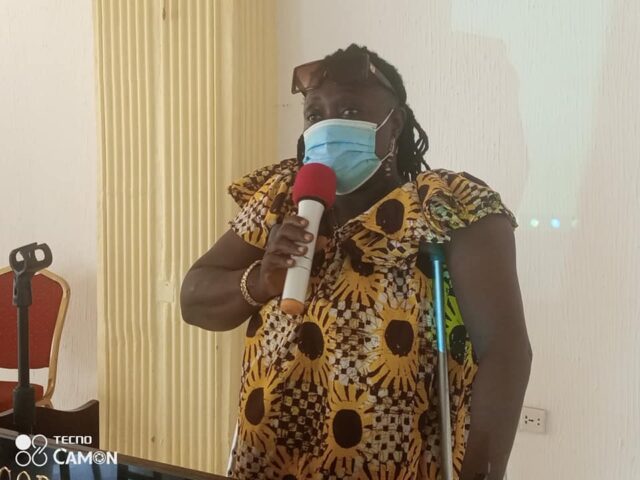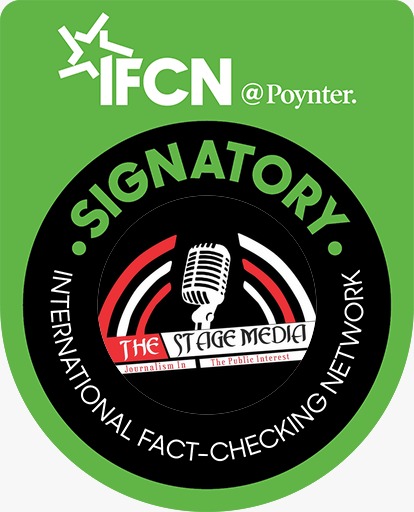
Onesimus S. Garway
The President of the National Union of Organizations of Disabilities (NUOD) of Liberia, Naomi Harris, has made finger-pointing statements towards the Liberian Media for underreporting the impactful activities of Persons with Disabilities for more than a Century, a posture that has made disabled practically underestimated.
Mrs. Harris said the voices of the PwDs have been kept under the carpet, owing to a societal mindset that when one is faced with disability, such person does not have the capability to play an essential role in the daily happenings of their environment.
She was specific during her remarks in Monrovia at a Refresher Training organized by Internews Liberia in reference to its PwDs Fellowship Project, stating it is time for the front pages and headlines of different newspapers and Radio Stations to be flooded with stories concerning physically challenged people with visual, hearing and speech impairments.
Though the NUOD President acknowledged the farsighted intervention of Internews Liberia but emphasized that a lot should be shouldered by the media and civil society to ensure increased availability of PwDs in the country.
The refresher is meant to evaluate the reports of journalists in the past five months concerning the disabled community and re-strategizing for more focus of the media on the PwD’s livelihood and impacts.
The Union has existed for 26 years since it was established by twenty-six disabled members institutions in 1995, but the activities of the disabled have since been prioritized in 1977 during the Administration of Liberia’s fallen President William Richard Tolbert when he returned from the Organization of African Unity (OAU) Conference.
The institutional membership has increased to 62.
The NUOD President, whose tenure will climax in 2023, also said “there’s nothing about us without us”; a statement that was directed at her colleagues in the disabled community to get more involved with airing their voices and letting go of the past marginalization experiences.

In respect to the PwDs Fellowship, Internews Liberia through its Senior Advisor, Jefferson Massah disclosed that the exercise is intended to awaken Media appetite in prioritizing Persons with Disabilities and their activities similarly as the political stories are given high preference; a project that began February this year with media fellows and editors competitively recruited from six counties.
Internews Liberia Media project is funded by USAID, a project that is working along with journalists from Grand Cape Mount, Margibi, Bong, Nimba, Montserrado and Grand Bassa counties.
At the forum, the media participants emphasized the need for total reform in the names of Disabled Organizations across the country that will confound to International Protocols that checkmate people from referring to PwDs in a discriminatory manner.
According to the Fellows, Editors and Mentors; the disabled groups are still bearing names like “Christian Association of the Blind”, “School of the Deaf”, and Albino Association, including other names of red-flag or stigmatization, a situation the journalists recommended to be reformed.
The journalists agreed that some of the preferred ways of referring to Persons with Disabilities include; physically challenged, visually and mentally impaired, as well as speech and hearing impairments, Persons with Albinism, Limited Vision, partially Sighted, epileptic, midget, mentally retarded (intellectual Disability) and Lame, among other terminologies.
In 2005, the Liberian Government established the National Commission on Disabilities, signed and ratified the Convention on the Rights of Persons with Disabilities, but the concern for employment, skill development and training continue to form part of the many advocacies’ points raised by physically challenged as well as people with speech and hearing challenges.
It is a reality that since the 2008 National Housing and Population Census, data on PwDs has not been updated, considering that the official institution responsible for data collection is LISGIS; though UNDP has since in August 2021 highlighted the urgent need for an update of the country’s data on PwDs for better planning and budget allocation for their special needs.
But it is estimated that 16 percent of the Liberian population have various disabilities, according to the 1997 UNICEF Studies, a percentage that may have possibly increased considering the past 24 years since the Studies was conducted by the international body, yet the 4% targeted employment enshrined in the Commission Act has not been fully realized.
Meanwhile, Disabilities is not just a health problem or impairment, instead, it is a complex phenomenon, reflecting the interaction between features of the society in which he or she lives




